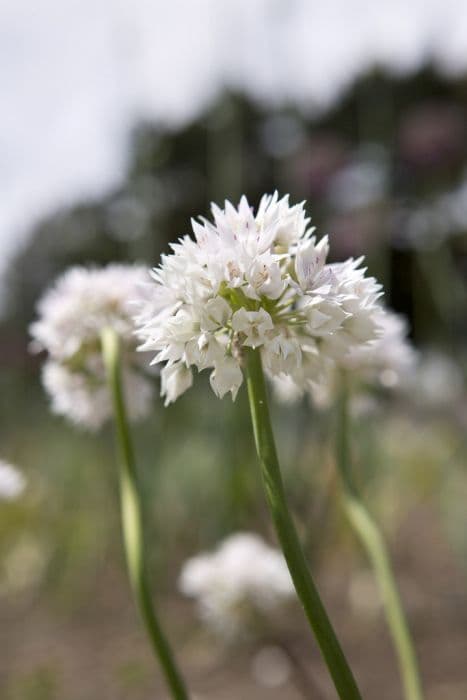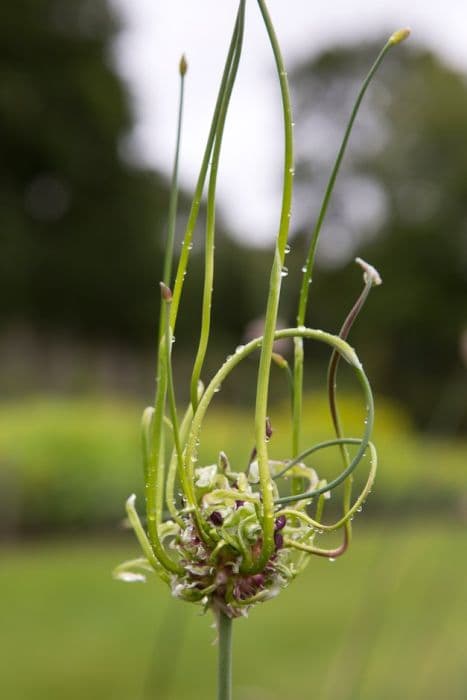Ornamental Onion Allium 'Round 'n' Purple'

ABOUT
Allium 'Round 'n' Purple' is an ornamental plant with distinctive spherical flower heads that stand out with their rich purple color. Each flower head is formed of tightly clustered, tiny, star-shaped blooms that create a dense and showy globe. This unique flower shape adds a geometric element to gardens and floral displays. The deep purple hue of the blossoms lends a touch of luxury and can be quite striking against the green of the surrounding foliage. The foliage of the plant typically consists of strappy, grass-like leaves that are a vibrant green color. These leaves often emerge from the base of the plant, creating a lush and tidy clump. In summary, Allium 'Round 'n' Purple' is characterized by eye-catching round flower heads composed of small purple flowers and complemented by green strap-like leaves. Its distinctive shape and bold coloring make it a favorite among gardeners looking to add a pop of color and architectural interest to their floral arrangements or garden beds.
About this plant
 Names
NamesFamily
Amaryllidaceae
Synonyms
Ornamental onion, Purple Sensation Allium, Round and Purple Allium
Common names
Allium 'Round 'n' Purple'.
 Toxicity
ToxicityTo humans
Allium 'Round 'n' Purple', commonly known as ornamental onion, is not considered highly toxic to humans. However, if ingested in large quantities, it may cause gastrointestinal discomfort, such as nausea, vomiting, and diarrhea. The plant also contains compounds that can potentially cause irritation to the skin, mouth, and digestive tract if not handled or cooked properly. Ingesting small amounts is unlikely to cause serious harm, but consuming large amounts or the concentrated essential oils can lead to more severe symptoms.
To pets
Ornamental onion is toxic to pets, especially cats and dogs. Ingesting this plant can lead to symptoms such as nausea, vomiting, and excessive drooling. In more severe cases, it can cause gastrointestinal irritation, lethargy, and in rare instances, can even lead to anemia or serious digestive issues. If you suspect your pet has ingested ornamental onion, it is important to contact your veterinarian immediately.
 Characteristics
CharacteristicsLife cycle
Perennials
Foliage type
Deciduous
Color of leaves
Green
Flower color
Purple
Height
1-2 feet (0.3-0.6 meters)
Spread
1-2 feet (0.3-0.6 meters)
Plant type
Bulb
Hardiness zones
4-8
Native area
Asia
Benefits
 General Benefits
General Benefits- Ornamental Appeal: Adds striking visual interest to gardens with its round, purple flowers.
- Drought Tolerance: Requires minimal watering once established, making it suitable for xeriscaping.
- Low Maintenance: Needs little care beyond basic needs, ideal for gardeners of all levels.
- Attracts Pollinators: Draws in bees and butterflies, promoting pollination in the garden.
- Deer and Rodent Resistant: Naturally repels grazing animals, reducing plant damage.
- Compact Size: Fits well in small gardens or as a border plant without overwhelming the space.
- Perennial Growth: Reemerges year after year, providing lasting beauty with minimal replanting.
- Edible Parts: Some alliums have edible components, though it’s essential to verify the edibility of the specific variety.
 Medical Properties
Medical PropertiesThis plant is not used for medical purposes.
 Air-purifying Qualities
Air-purifying QualitiesThis plant is not specifically known for air purifying qualities.
 Other Uses
Other Uses- Allium 'Round 'n' Purple', commonly known as ornamental onion, can be utilized as a natural dye for fabrics, imparting a subtle color due to its pigmented foliage and flowers.
- Ornamental onions can be used in floral arrangements, both fresh and dried, providing a unique, spherical shape and a pop of color that can last for weeks.
- The dried seed heads of ornamental onions can be spray-painted and used in craft projects, adding an interesting texture to wreaths and other decorative items.
- The strong scent of ornamental onions can be harnessed to repel certain insects and animals from gardens and outdoor living spaces.
- Allium 'Round 'n' Purple' can be planted as a companion plant to deter aphids and protect more vulnerable plants in a mixed border.
- The plant can serve an educational purpose in a garden that aims to teach about various types of bulbous plants and their growth habits.
- Ornamental onions, when strategically placed, can help define garden pathways and borders with their distinctive foliage and blossom height.
- These flowers can play a role in a sensory garden, offering not only visual appeal but also a distinct, onion-like fragrance when leaves or stems are crushed.
- The stiff stems of the ornamental onion can be used in art classes for making botanical prints or nature-inspired art pieces.
- Used in photography, Allium 'Round 'n' Purple' can create interesting focus points or backdrops due to their bold, spherical blooms and rich coloration.
Interesting Facts
 Feng Shui
Feng ShuiOrnamental onion is not used in Feng Shui practice.
 Zodiac Sign Compitability
Zodiac Sign CompitabilityOrnamental onion is not used in astrology practice.
 Plant Symbolism
Plant Symbolism- Unity: Alliums in general symbolize unity due to their globe-like cluster of flowers, representing the coming together of many different parts to form a whole.
- Patience: As a plant that takes a full season to bloom, alliums are often associated with patience and the reward that comes from waiting.
- Humility: Despite their impressive display, alliums, commonly known as ornamental onions, remind us of the humble and common onion, symbolizing humility.
- Good Fortune: In some cultures, alliums are believed to bring luck, probably due to their many seeds symbolizing abundance.
- Strength and Courage: Their robust nature and ability to grow in different conditions reflect the qualities of strength and courage.
 Water
WaterThe ornamental onion, commonly referred to as Allium 'Round 'n' Purple', should be watered deeply to promote strong root development, ensuring moisture reaches down to the roots. Watering should occur approximately once a week, providing about an inch of water each time, which is roughly 0.6 gallons per square foot per week, depending on soil type and weather conditions. During the growing season, when the plant is active, it may require more frequent watering. Reduce watering frequency to every other week as the plant goes dormant in late summer or fall. It is important to allow the soil to dry out between waterings to prevent rot.
 Light
LightOrnamental onions thrive best in full sunlight, so it's important to plant Allium 'Round 'n' Purple' in a location where it receives at least 6 to 8 hours of direct sunlight each day. An ideal spot would be an area that is exposed to the sun throughout most of the day without significant shade, as the bright conditions will encourage the healthiest growth and best bloom production.
 Temperature
TemperatureAllium 'Round 'n' Purple', or ornamental onion, prefers moderate temperatures and can tolerate a range from around 40°F to 85°F. However, it grows best in temperatures between 55°F and 75°F. The plant is hardy and can handle temperatures as low as approximately 20°F, though it should be protected from extreme cold and frost which can be damaging.
 Pruning
PruningPruning of Allium 'Round 'n' Purple' is generally limited to deadheading spent flowers to encourage additional blooms and to tidy up the plant's appearance. This should be done as the flowers fade, typically in late spring or early summer. Additionally, foliage should be left in place until it has died back completely, as it provides energy for the bulb for the next year's growth.
 Cleaning
CleaningAs needed
 Soil
SoilThe ornamental onion 'Round 'n' Purple' thrives best in well-draining soil enriched with organic matter, with a pH level ranging from 5.5 to 6.5. A suitable soil mix can be made by combining two parts garden soil, one part compost, and one part perlite or sand to ensure proper drainage.
 Repotting
RepottingOrnamental onions like 'Round 'n' Purple' are typically perennials grown from bulbs and do not require frequent repotting. They should be replanted every 3-4 years to refresh the soil or if the bulbs have outgrown their space.
 Humidity & Misting
Humidity & Misting'Round 'n' Purple' ornamental onions prefer average outdoor humidity levels and do not require any special humidity adjustments when grown in garden settings.
 Suitable locations
Suitable locationsIndoor
Place in bright light, ensure good drainage.
Outdoor
Full sun, well-drained soil, space bulbs 6".
Hardiness zone
4-8 USDA.
 Life cycle
Life cycleAllium 'Round 'n' Purple', commonly known as ornamental onion, begins its life cycle with seed germination, typically occurring in the spring when temperatures and soil conditions are appropriate. The seeds develop into small bulbs, from which emerge green shoots that grow and form clumps of strap-like foliage. During late spring to early summer, tall stems rise above the foliage, bearing spherical, purple flower heads that attract bees and butterflies. After flowering, the plant undergoes pollination, which can be followed by seed formation if the flowers are left on the plant. As the season progresses into late summer, the foliage begins to yellow and die back as the plant enters dormancy; the bulb remains underground, storing energy for the next growing season. In subsequent years, the lifecycle repeats itself, with established bulbs capable of producing offsets to gradually form larger clumps.
 Propogation
PropogationPropogation time
Spring-Early Summer
Propogation: The Allium 'Round 'n' Purple', commonly referred to as ornamental onion, is typically propagated through division, a method where the bulbs or clumps of the plant are separated into smaller parts. The most popular time to propagate this Allium by division is in the fall, after the leaves have died back, or in early spring before growth begins. To propagate by division, carefully dig up the entire clump and gently separate the bulbs, ensuring that each new division has a portion of the root system attached. Replant the divisions at the same depth they were previously growing, usually about 6 to 8 inches (15 to 20 centimeters) deep, spacing them about 8 to 12 inches (20 to 30 centimeters) apart to provide adequate room for growth. Water the new plantings thoroughly to help establish roots. This straightforward method allows the gardener to expand their collection of Allium 'Round 'n' Purple' and fill out garden spaces or share with fellow garden enthusiasts.








